
- This event has passed.
Green Chemistry Connections
February 21, 2024 @ 12:00 pm - 2:00 pm
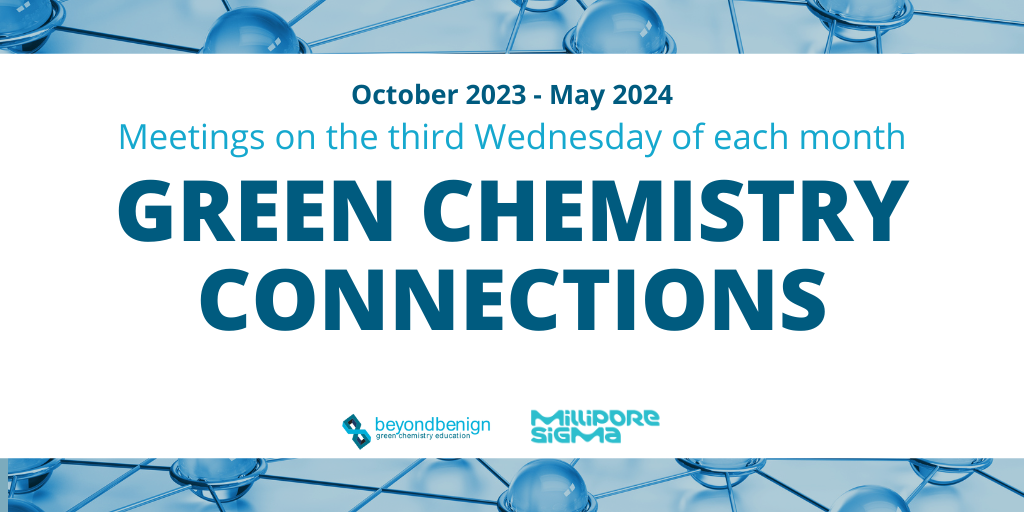
Beyond Benign will host virtual and monthly Green Chemistry Connections around Green Chemistry education using the Green Chemistry Students Learning Objectives from the Green Chemistry Commitment program as a loose framework. Register to stay in the loop about upcoming speakers.
Each time we meet, we will host community leaders actively practicing Green Chemistry and/or Toxicology in their courses and/or laboratories. Connections grow through time dedicated to small group discussions, networking, and resource sharing.
We ask that you BYOR, bring your own resource or request to the community – share a resource or put a request out to the group for resources you need.
We invite you to bring your departmental colleagues, external collaborators, graduate teaching assistants, etc. to the discussion as we will be holding this space and time monthly for the community to come together around Green Chemistry education to advance the field together!
After registering, you’ll receive more information about the Green Chemistry Connections via calendar invites and emails as the meeting time approaches.
For event recordings, conversations, and networking, visit the Green Chemistry Connections Event Connections Forum on the GCTLC.
October
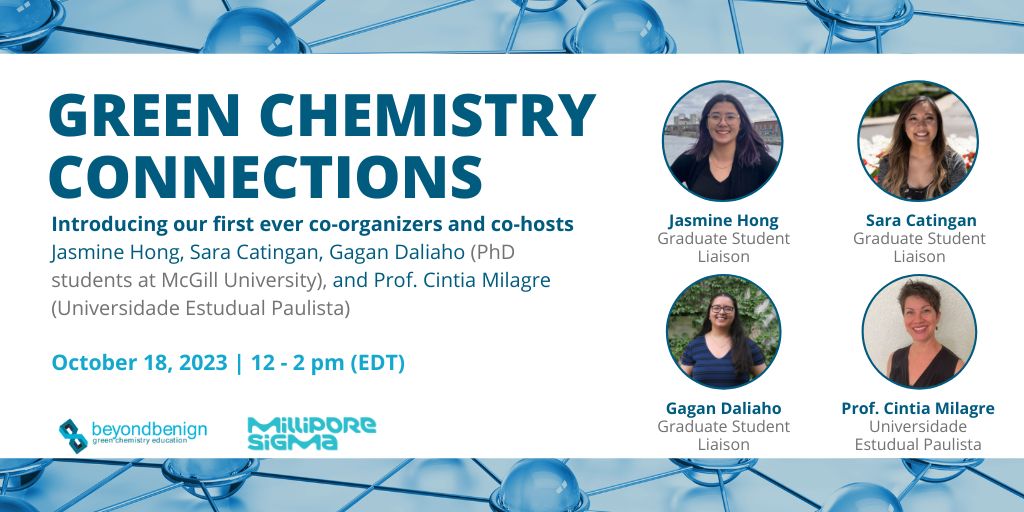
Introducing our First Ever Co-Organizers and Co-Hosts
10/18/2023; 12- 2 PM EDT
At our October session, you will meet our first ever Green Chemistry Connections Co-Organizers and Co-hosts, learn about opportunities to share your work during a Connection, hear more about the Green Chemistry Teaching and Learning Community (GCTLC) – the new virtual platform for our amazing green chemistry community – and be invited to opportunities to engage with us!
November
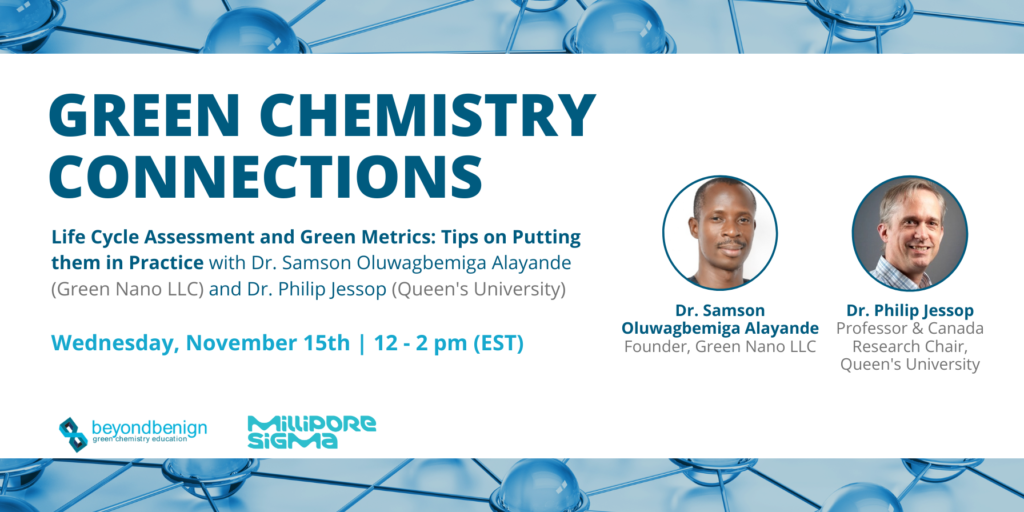
Life Cycle Assessment and Green Metrics: Tips on Putting them into Practice
11/15/2023; 12-2 PM EDT
At our November session, you will hear from Dr. Samson Alayande (Founder, Green Nano LLC) and Dr. Philip Jessop (Professor and Canada Research Chair, Queens University, Canada) as they share presentations and insights about life cycle assessments (LCAs).
December
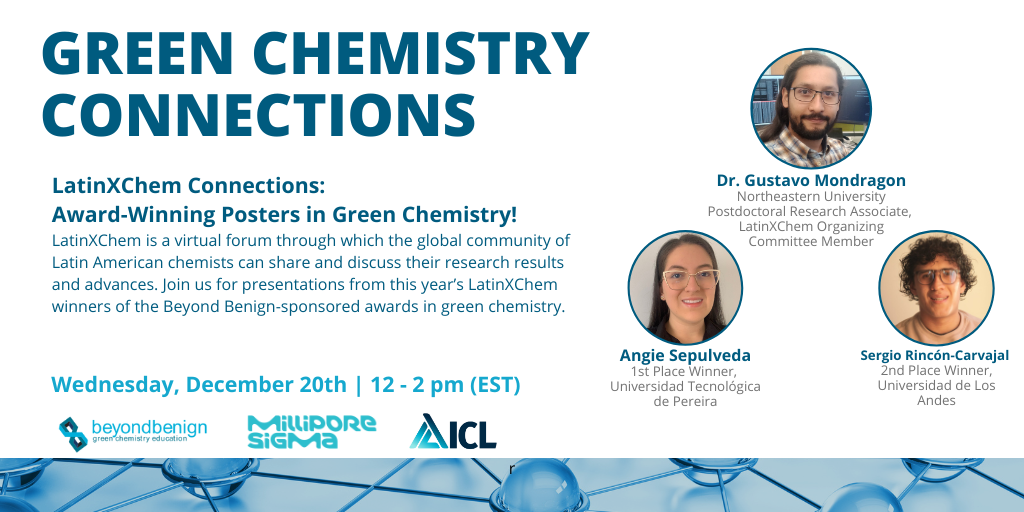
LatinXChem Connections: Award-Winning Posters in Green Chemistry
12/20/2023; 12-2 PM EST
At our December session, you will learn more about the LatinXChem annual Twitter Poster Conference from LatinXChem organizing committee member, Gustavo Mondragon.
This year, Beyond Benign was honored to sponsor two awards for posters in the green chemistry category. You will hear from winners Angie Sepulveda and Sergio Rincón-Carvajal as each will share their work. Find their posters linked below!
??Angie Vanessa Patino Sepulveda (Universidad Tecnológica de Pereira), “Millimeter-Scale Physicochemistry and Its Impact on Green Chemistry in the Laboratory Environment”
(https://lnkd.in/ee2KmSjb)
??Sergio Rincón-Carvajal (Universidad de Los Andes), “Design of simple, low-cost ball mill for teaching mechanochemistry to undergraduate students”
(https://lnkd.in/eYuTuBmS)
January
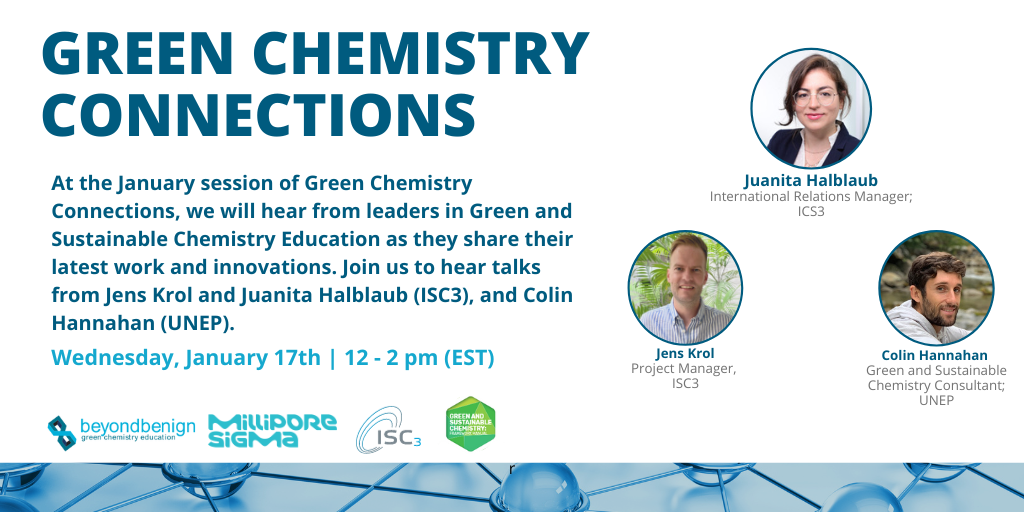
“Sustainable Chemistry: Preview of ISC3’s Vision and E-learning Module” and “UNEP Manuals on Green and Sustainable Chemistry”
1/17/2024; 12-2 PM EST
Read more about this month’s expert speakers from the International Sustainable Chemistry Collaboration Center (ISC3) and United Nations Environment Programme (UNEP) below.
“Sustainable Chemistry: Preview of ISC3’s Vision and E-learning Module”
Speakers: Jens Krol and Juanita Halblaub (ISC3)
Jens is from the Netherlands, has a master’s in biotechnology and has worked as a chemistry teacher in the Netherlands and in Afghanistan through a special program of the German government. He currently manages the educational activities of ISC3. He loves Chemistry education and is therefore very happy to be part of this Green Chemistry Connection.
Juanita holds an MBA in international business and works at the ISC3 on the topic of sustainable chemistry innovation. She currently works on a publication that discusses examples of Sustainable Chemistry and is excited to share some of those examples with you.
Jens Krol and Juanita Halblaub will present products the ISC3 is developing and are looking forward to getting as much feedback as possible!
“UNEP Manuals on Green and Sustainable Chemistry”
Speaker: Colin Hannahan (UNEP)
Colin has worked on green and sustainable chemistry as a consultant with the UNEP chemicals and health branch since January 2021. Originally from the U.S.A., Colin holds his bachelor’s in chemical engineering from the University of Massachusetts and a Masters in Sustainable Chemistry from the Universitat Politecnica de Valencia in Spain. He has experience working with a range of stakeholders on strengthening green chemistry education and the science-policy interface.
February
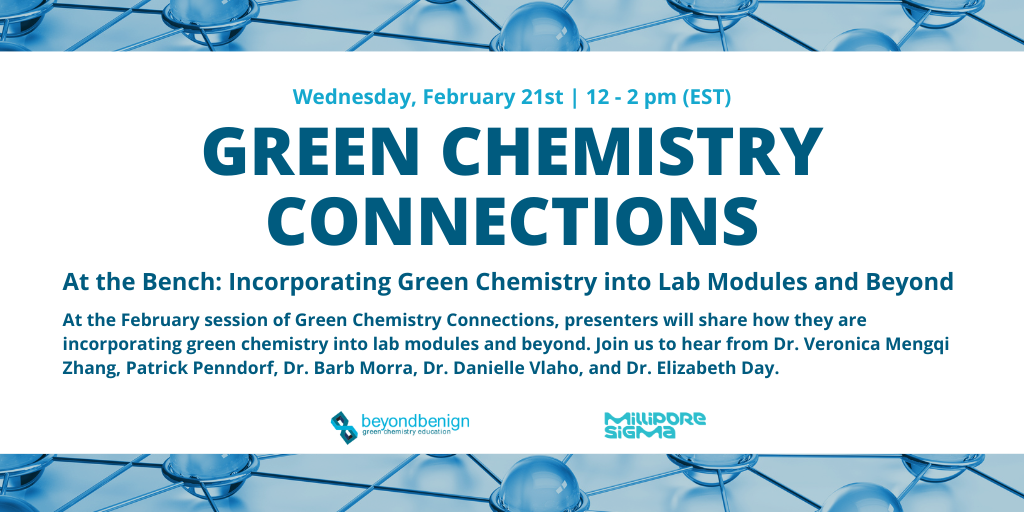
Investigating green and sustainable chemistry through case studies
Dr. Veronica Mengqi Zhang, Organic Chemistry Lab Instructor, Michigan State University
Dr. Mengqi (Veronica) Zhang Mengqi (Veronica) Zhang is the organic chemistry laboratory coordinator at the Chemistry Department, Michigan State University. Her research interest focuses on curriculum development, instructional laboratory experiment design, green chemistry, and microwave chemistry. She is also an active member of ACS local sector and the Three-Dimensional Learning Team at MSU.
Taking Action in the Laboratory – Equipement and Plastics
Patrick Penndorf, Sceince Communicator and Sustainability Advocate, ReAdvance
Patrick Penndorf is a scientist from Germany with a background in Biochemistry. During his Bachelors thesis in Protein Chemistry, he started to come up with more sustainable protocols for his experiments. However, it was not until a research stay in Canada, that he got in touch with some colleagues that were as enthusiastic about sustainability as he was. They started an initiative and soon hosted an online conference to share insights into sustainable practices with scientists worldwide. Today, this initiative is called ReAdvance. They share their own insights and work together with international research societies, companies and initiatives to promote their solutions. It is their goal to help each and every scientist to make their science more sustainable by spreading greener protocols, labware and approaches.
Investigating green and sustainable chemistry through case studies
Dr. Elizabeth Day Assistant Professor, Department of Chemistry & Biochemistry at the University of Texas at El Paso
Dr. Day is an analytical chemist with a major focus on chemistry education research and an interest in science/STEM education. Her expertise is in curriculum development and evaluation, assessment design, and green and sustainable chemistry education. Her laboratory leverages education research methods (mix of qualitative analysis, statistical modeling, and design-based research methods) to discover how to support student learning. Specifically, her approach centers assessing to support students’ knowledge-in-use through the framing of the Three-Dimensional Learning framework and a socio-cognitive perspective on educational measurement. Dr. Day is currently an Assistant Professor in the department of Chemistry & Biochemistry at the University of Texas at El Paso.
Reinforcing Green Chemistry Education in the Undergraduate Teaching Laboratory at the University of Toronto
Dr. Barb Morra Associate Professor, Teaching Stream, University of Toronto
Barb Morra is an Associate Professor, Teaching Stream, in the Department of Chemistry at the University of Toronto. Barb’s passion for chemistry and teaching translate into her pedagogical research and curriculum development initiatives which have resulted in a suite of research-based laboratory experiments, activities, and technological tools that help undergraduate students connect chemistry with research and applications. To further these efforts, Barb actively works with undergraduate and graduate students in pedagogical projects. Barb’s interest in green and sustainable principles has led her to transform chemistry education within her department through a variety of initiatives that have been recognized through the Green Chemistry Commitment program. Her role within several international green chemistry programs has allowed her to foster a green chemistry education community that empowers global educators to make meaningful changes in their teaching. Examples include her roles as an assessment consultant for the Green & Sustainable Chemistry Education Module Development Project and curriculum developer for the Toxicology for Chemists Program.
Rethinking Reactions, McGill’s Approach to Green Chemistry in the Organic Lab
Dr. Danielle Vlaho, Academic Associate at McGill University
Danielle is an Academic Associate in the Department of Chemistry at McGill University. As the lab instructor for the organic chemistry courses, she is interested in the development and implementation of robust and sustainable chemistry experiments that foster scientific curiosity.
Dr. Matthew James Harrington, Professor and Canada Research Chair Tier 2 in Green Chemistry (McGill University)
Matthew Harrington is Professor and Canada Research Chair Tier 2 in Green Chemistry in the Department of Chemistry at McGill University, as well as co-director of the McGill Institute of Advanced Materials (MIAM) and director of the McGill Chemistry Characterization (MC2). He received his Ph.D. in 2008 from the University of California, Santa Barbara in the lab of J. Herbert Waite. This was followed by a Humboldt postdoctoral fellowship at the Max Planck Institute of Colloids and Interfaces in the Department of Biomaterials, where he was later a research group leader from 2010 until 2017. His research is focused on understanding biochemical structure–property relationships in the function and formation of biological materials and applying extracted design principles for the development and sustainable production of bio-inspired materials.
Enabling technologies for the sustainable chemical synthesis of high added-value compounds from renewable sources.
Professor Julio Pastre, University of Campinas
Prof. Dr. Julio C. Pastre obtained his PhD in 2009 at the University of Campinas – UNICAMP. He then worked as a research scientist at Rhodia-Solvay before moving back to UNICAMP for postdoctoral studies with Professor Ronaldo A. Pilli. In 2012, he joined the group of Professor Steven V. Ley at the University of Cambridge. Two years later, Julio established his independent research group at UNICAMP and recently became Associate Professor. He is now the Head of the Department of Organic Chemistry. Recently, he was recognized as an ‘Emerging Investigator’ by Reaction Chemistry & Engineering and RSC Advances and a ‘New Talent from the Americas’ by RSC Medicinal Chemistry. He received the Thieme Chemistry Journals Award by Synfact, Synlett and Synthesis – Thieme in 2023. His research interest focuses on the development of new synthetic methods using enabling technologies for the synthesis of high added-value compounds from renewable sources, including platform molecules, new chemicals, and APIs.

